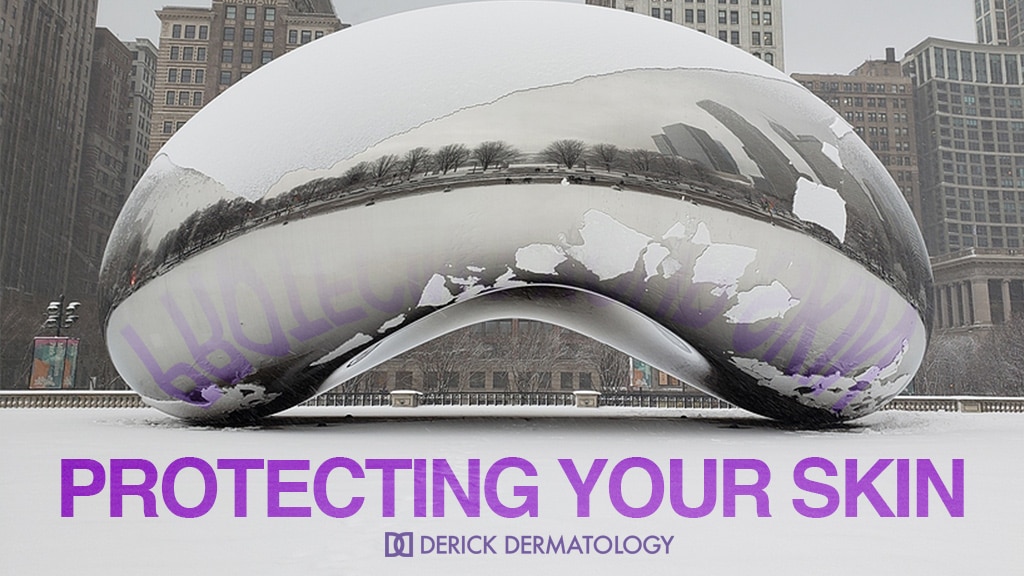Protecting the Skin from Chicago’s Cold Winds
While the World Atlas does not credit the breezes from Lake Michigan for naming Chicago the Windy City, the cold and dry gusts make skincare in the winter extremely challenging. Dryness produces effects on the skin that everyone recognizes and no one wants, but preventing it requires a dedicated effort. On the other hand, retaining moisture supports healthy skin, protecting it from appearing scaly and feeling chapped or tight. In addition, a regimen of care can protect the skin from indoor heat and extreme outdoor cold for routine maintenance. Finally, when skin issues require expertise in medical, surgical, or cosmetic dermatology, Chicago’s 18 locations of Derick Dermatology provide superior care.
Finding Easier Than Expected Tips for Healthy Skin
Protecting the skin from Chicago’s elements in the winter requires about the same level of effort as doing so in the summer. The sun and wind create an ever-present demand for protection in all seasons. Nonetheless, winter produces additional needs for enhancing skincare. Some commonsense tips for keeping skin healthy in Chicago’s freezing winters require less effort than one may think. Each small step takes little effort but can make a huge difference.
Moisturizing
Everyone expects the same advice about the importance of moisturizing skin, but it does offer the best of all protective measures. Products with a thick cream base produce the best effects on normal or dry skin. In addition, an application right after a bath captures and helps retain surface moisture. Finally, when moisturizing does not alleviate troublesome skin issues, a trip to a conveniently located Derick dermatologist can resolve them.
Preventing Chapped Lips
Staying indoors on dry, cold days offers protection from conditions that cause lips to chap. However, going to work while the brisk winds coming off Lake Michigan makes it an unlikely choice. Practical options include wearing a scarf or mask over the lips and lower face to provide essential protection. In addition, lip balm can prevent painful cracking that results from dryness. Products that contain no fragrance or dyes offer a better way to prevent chapping. In addition, lips have a heightened reaction to dehydration. The condition often occurs in the winter when the summer heat does not remind people to drink at least 64 ounces of water every day to promote healthy skin. Thus, a lack of adequate water intake affects the body in many ways.
Bathing Conservatively
While hot water and rich, soapy lather may seem luxurious and desirable, they can actually make skin dryer. Face, hands, feet, and areas where the skin folds need daily cleaning, but everything else can benefit from a rinse. In addition, lukewarm water and short showers or baths help preserve the skin’s natural moisturizers.
Lowering Indoor Heat
A trade-off between feeling warm and toasty or sparing the skin from unnecessary dryness presents a challenge. Almost everyone enjoys coming in from the cold and enjoying a warm and welcoming environment. However, warm air dries the skin, and a lower thermostat setting helps prevent it.
Increasing Indoor Moisture
As indoor heat dries the air and skin, a humidifier can restore moisture. A portable appliance benefits the skin and nasal passages, proving especially effective with lower settings on the thermostat. Furnaces may accept a humidifier that treats an entire house, or a unit in each bedroom helps replace the moisture that helps keep skin healthy.
Remembering to Wear Sunscreen
A misconception about needing sunscreen only in the summer can contribute to skin dryness and the complications that often accompany it. Dry skin can lead to atopic dermatitis or eczema, conditions that may require the attention of a Derick dermatologist. In addition, bacteria can enter cracks in the skin, allowing infections to develop. The need for sunscreen remains as great in the winter as in the summer, and it may even exceed it in some cases. Snow acts as a magnifying reflector of the sun’s UV rays, making protection essential. Sunscreen properties in moisturizers serve a dual purpose, and a dermatologist can recommend the best level of SPF for different skin types. An application of sunscreen for each trip outdoors needs to cover all exposed skin on the face, neck, arms, and hands. Neck skin beneath the jaw often goes overlooked, but its ability to receive the sun’s rays, directly and indirectly, deserves consideration.
Protecting the Largest Organ
Skin serves as the body’s largest organ whether it receives protection during the winter or must cope with stiff challenges. While easy to assume that all organs have an internal location, the skin proves the opposite. National Geographic cites the 8 pounds and 22 square feet of skin as a fleshy covering that serves many purposes. For example, people depend on it as a waterproof shield that insulates the body against the elements and guards against chemicals in the atmosphere. In addition, natural antibacterial substances on the skin prevent infection.
Further, bones receive calcium after the skin converts the sun’s rays into vitamin D. The brain relies on it as a sensor that detects forces in the environment and provides alerts that require action. With proper care and protection from weather extremes, the skin can retain supple flexibility throughout a lifetime. When wintry cold makes painful skin conditions occur, a dermatologist at Derick Dermatology’s 18 locations in Chicago’s suburbs stands ready to help.







